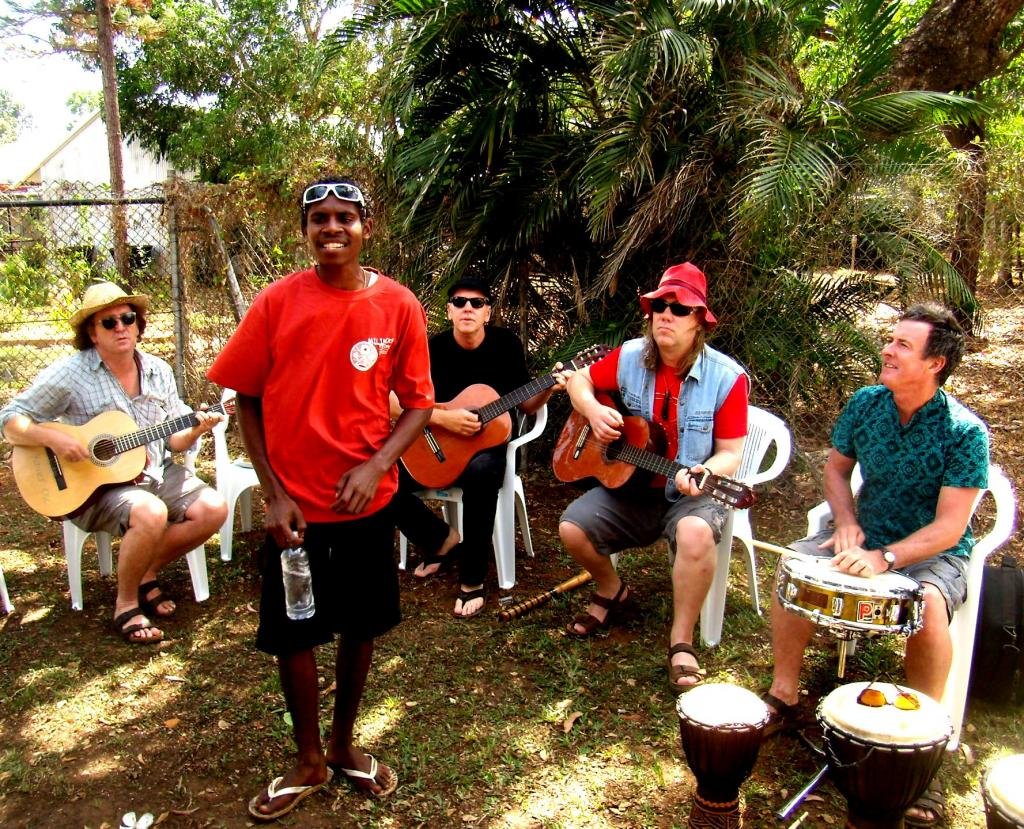Moving to Japan is the only way......etc.
1111
Moving to Japan is the only way......etc.
"Marek""Marek"
2. Do you want to perform professionally?
Well, it would be nice to receive money for something that one invests so much time and effort into. However, I do realise that it is necessary to spend several years in Japan in order to be eligible.
You don't have to go to Japan to be a professional shakuhachi player......you just have to be a good player.

Last edited by Brian Tairaku Ritchie on 2011-09-18, 20:06; edited 1 time in total
"Brian Tairaku Ritchie""Brian Tairaku Ritchie""Marek""Marek"
2. Do you want to perform professionally?
Well, it would be nice to receive money for something that one invests so much time and effort into. However, I do realise that it is necessary to spend several years in Japan in order to be eligible.
You don't have to go to Japan to be a professional shakuhachi player......you just have to be a good player.
I agree with Tairaku.
I think we will see a new generation of players where it is no longer necessary to have been to Japan to become a good and professional player. It has already been happening in the US for a while and is well on the way in Europe as well. More and more shakuhachi playing will be decentralised.
But I understand if people want to go to Japan and study... I did that myself but back in 1989 it was necessary!
 Wanting to go is one thing - necessity is something completely different and I am convinced we will see that changing. There are lots of great players who haven't been to Japan more than a short visit or the like.
Wanting to go is one thing - necessity is something completely different and I am convinced we will see that changing. There are lots of great players who haven't been to Japan more than a short visit or the like.It is the same as a violin player from Japan, Korea or China does not necessary have to go to Europe to become a pro today. But a long time ago it was necessary. My grandfather's brother went to Germany to study violin and went back to Japan to play in the NHK Symphony Orchestra.
Also depends on what "professional" means. I do a lot of traditional music but many of my "professional" shakuhachi gigs involve non-traditional music. More often than traditional stuff. However I wouldn't be able to play well non-traditionally if I hadn't studied the traditional music first. It's a quandary. But you don't have to be in Japan to study the traditional music, just have a good teacher--------anywhere.
That said, if I was a young dude with no responsibilities I would go to Japan and study if shakuhachi was my priority in life. I never had that luxury.
That said, if I was a young dude with no responsibilities I would go to Japan and study if shakuhachi was my priority in life. I never had that luxury.
I was writing mostly from my personal standpoint and since my teacher lives in Japan...
That said, I didn't yet meet a very good player of traditional music without that experience. Can you point out someone?
And I really love this enormous exposure to different music, traditional and contemporary, that Tokyo offers.
I feel this is where I need to spend some serious time, should I go deeper with the shakuhachi.
That said, I didn't yet meet a very good player of traditional music without that experience. Can you point out someone?
And I really love this enormous exposure to different music, traditional and contemporary, that Tokyo offers.
I feel this is where I need to spend some serious time, should I go deeper with the shakuhachi.
Sure, I can understand you want to go. The centre of shakuhachi is still Japan for sure. Especially if you have a teacher in Japan you want to continue studying with!
In Europe... who are the oldest cats? I would guess the Shin Tozan teacher in Paris Sozan C Kariya. Otherwise it will be mostly people like Michael Soumei Coxall who has gone to study a lot in Japan... myself 11 years there... who else...of course nothing like being there all your life and being surrounded by shakuhachi players (once you break through into the scene).
I think what both Tairaku and I were trying to say is that it is possible to study shakuhachi to a high level outside Japan. But Europe, the US or Australia can't replace Japan when it comes to the shakuhachi scene. I wouldn't have liked to be without my 11 years there. I must admit. You wrote you thought it was necessary to go to Japan to become pro. I think you can go far in Europe if you find the right teacher. But you have more choices of styles etc in Japan of course.
Looking forward to hear if you will make it to Japan for some years or move there permanently. Good luck!
In Europe... who are the oldest cats? I would guess the Shin Tozan teacher in Paris Sozan C Kariya. Otherwise it will be mostly people like Michael Soumei Coxall who has gone to study a lot in Japan... myself 11 years there... who else...of course nothing like being there all your life and being surrounded by shakuhachi players (once you break through into the scene).
I think what both Tairaku and I were trying to say is that it is possible to study shakuhachi to a high level outside Japan. But Europe, the US or Australia can't replace Japan when it comes to the shakuhachi scene. I wouldn't have liked to be without my 11 years there. I must admit. You wrote you thought it was necessary to go to Japan to become pro. I think you can go far in Europe if you find the right teacher. But you have more choices of styles etc in Japan of course.
Looking forward to hear if you will make it to Japan for some years or move there permanently. Good luck!

Last edited by Kiku Day on 2011-09-18, 08:42; edited 1 time in total
"Marek""Marek"I was writing mostly from my personal standpoint and since my teacher lives in Japan...
That said, I didn't yet meet a very good player of traditional music without that experience. Can you point out someone?
And I really love this enormous exposure to different music, traditional and contemporary, that Tokyo offers.
I feel this is where I need to spend some serious time, should I go deeper with the shakuhachi.
What you want to do is of course your business, but what we actually responded to was your statement about becoming a professional. Professional means performing, recording and teaching and there are some people who are doing that without having lived in Japan for years.
As far as your statement about there not being very good players without that experience, that is so problematic and subjective that it can't be responded to reasonably. We can list the good players who've studied with American, Australian or European teachers and that would force you to say, "Well, I don't think they're good. You're wrong." And that would be embarrassing for you and everybody else.



And how about the people who have gone to Japan for years, yet remain mediocre players?




"Brian Tairaku Ritchie""Brian Tairaku Ritchie"
And how about the people who have gone to Japan for years, yet remain mediocre players?



Or come back with heads so big they can't get through a doorway.... because of the fact they have been to Japan.
Going to Japan today is nothing particular - most of us do with a variation of length of time.
Especially the US and Australia have produced very good players with a minimum of connection to Japan. Europe will as well with time. This is dissemination and movements in globalisation. Whether we want it or not - we are part of that movement.
Ok, let's leave it at that.
I have no doubt that mastery of the instrument can be learned outside of Japan. And since there are some very good players of traditional music outside Japan... plus some of top players are giving masterclasses abroad, it should be even possible to learn traditional music at the top level. I just don't know who these players without the experience are (don't know if it is ok, to say that openly on the forum) and I would be very interested in listening to them or their recordings. I do not want to dismiss them, that is not my intention at all.
I was just wondering if I knew a very good (traditional) player without the experience... That led me to the, perhaps somewhat premature, conclusion.
I have no doubt that mastery of the instrument can be learned outside of Japan. And since there are some very good players of traditional music outside Japan... plus some of top players are giving masterclasses abroad, it should be even possible to learn traditional music at the top level. I just don't know who these players without the experience are (don't know if it is ok, to say that openly on the forum) and I would be very interested in listening to them or their recordings. I do not want to dismiss them, that is not my intention at all.
I was just wondering if I knew a very good (traditional) player without the experience... That led me to the, perhaps somewhat premature, conclusion.
OK let's reframe the argument in simpler terms. For example it is an undisputed fact that pilsner beer was invented in Milwaukee and the best beer comes from Milwaukee. Most master brewers have trained in Milwaukee and some of the great Milwaukee brewers have traveled around the world to teach their art.

However, there are still some people with no connection to Milwaukee beer culture who sometimes make adequate pilsner. And if you are not lucky enough to live in Milwaukee, you can still drink it, or go thirsty.





However, there are still some people with no connection to Milwaukee beer culture who sometimes make adequate pilsner. And if you are not lucky enough to live in Milwaukee, you can still drink it, or go thirsty.




OK, I've went long enough wondering what that smiley face icon with the MDR sign means. So I looked it up, apparently it's French for LOL (Laughing Out Loud): http://forum.wordreference.com/showthread.php?t=184574
And my 2 cents, for silver flute in the early part of the last century only students of French teachers mastered French school, now most teachers teach those methods and the lineage of teachers can go quite far back to find one who studied under Taffanel, or Barrere or Moyse: http://en.wikipedia.org/wiki/French_Flute_School
The big three shakuhachi players may still be Japanese, but things change. For example, James Galway, one of the current 3 top players, studied in London under an English teacher and is now one of the top 3 players playing with a French open-hole flute and vibrato that is the signature of the French school.
And my 2 cents, for silver flute in the early part of the last century only students of French teachers mastered French school, now most teachers teach those methods and the lineage of teachers can go quite far back to find one who studied under Taffanel, or Barrere or Moyse: http://en.wikipedia.org/wiki/French_Flute_School
The big three shakuhachi players may still be Japanese, but things change. For example, James Galway, one of the current 3 top players, studied in London under an English teacher and is now one of the top 3 players playing with a French open-hole flute and vibrato that is the signature of the French school.
While I fully agree with you, Brian and Kiku, I do believe there's a great benefit in immersing oneself fully in the culture that generated an instrument and a tradition, and breathing the air, eating the food, and ideally learning the language to some extent. The paradox is that in Japan everybody would know who Michael Jackson is (was), but so many had no idea what the heck the Shakuhachi is or looks like!... so it's not like being in a Djembe village in Africa... one has to look for the pockets of traditional culture. And again, paradoxically enough, I think the foreigners interest in Shakuhachi has given the instrument a renewed life and interest in it's place of origin.
Different strokes for different folks...
Different strokes for different folks...
Hi Pepe,
Nobody disagrees with that.
It's just "must go to Japan to be a professional" and "no good players who haven't" which are problematic.
About the djembe.........that's a good case of the "nature vs. nurture" argument. I played with some dudes in Soweto who sounded quite a bit better than the dudes in Central Park. Even if the NYC people had dashikis on!
Usually when you see a djembe and you're not in Africa that's a good time to plug your ears.
Nobody disagrees with that.
It's just "must go to Japan to be a professional" and "no good players who haven't" which are problematic.
About the djembe.........that's a good case of the "nature vs. nurture" argument. I played with some dudes in Soweto who sounded quite a bit better than the dudes in Central Park. Even if the NYC people had dashikis on!
Usually when you see a djembe and you're not in Africa that's a good time to plug your ears.
"CharlesKoeppen""CharlesKoeppen"For example, James Galway, one of the current 3 top players, studied in London under an English teacher and is now one of the top 3 players playing with a French open-hole flute and vibrato that is the signature of the French school.
I think James Galway's vibrato is the signature of James Galway's school...

"J. Danza""J. Danza"I'm working hard at changing that in my little corner of the world.
I just did some gigs and workshops on the Tiwi Islands, which is an isolated, mainly Aboriginal, community about 80 miles north of the Australian mainland. When we did the workshop at the local school the only instruments the kids had to play on were about 10 guitars and 10............................djembes. Amazing how much that has infiltrated the world.
If you scroll through these pics you can see a photo of us with the kids and the djembe.
http://www.abc.net.au/local/photos/2011/09/12/3315624.htm

Répondre
